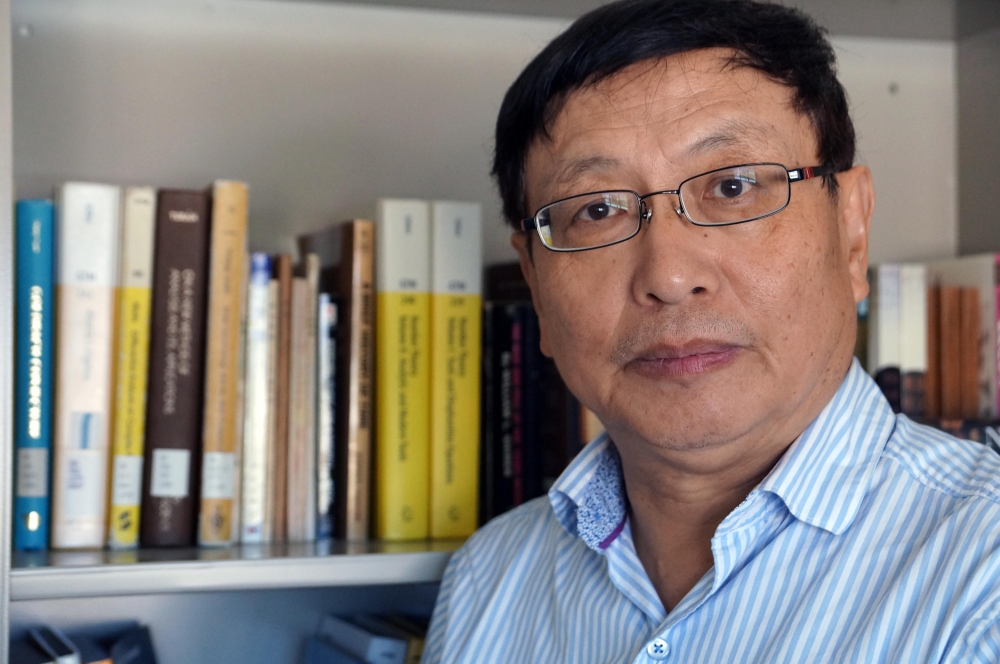
Master of Math
Yitang Zhang may not be a household name, but in the world of mathematics, the UC Santa Barbara professor is somewhat of a celebrity. His seminal work on the Twin Prime Conjecture made him famous in the field, earning him a host of prizes, including a MacArthur Fellowship.
Zhang’s most recent accolade is the Qiu Shi Outstanding Scientist Award, which he recently received in Beijing from the Qiu Shi Science & Technologies Foundation. The institution’s primary mission is to promote scientific and technological progress in China by recognizing and rewarding successful Chinese scientists and scholars.
In 2013, Zhang, a number theorist, submitted a proof to the “Annals of Mathematics” that established the first finite bound on gaps between prime numbers. So began his ascent to mathematics renown.
“Professor Zhang’s breakthrough paper, ‘Bounded Gaps Between Primes,’ has solved a pure mathematics problem attempted by mathematicians for more than 150 years,” said UCSB Chancellor Henry T. Yang. “The paper is so beautiful that some mathematicians have described the experience of reading it as similar to enjoying music and art.
“Even after receiving several of the world’s top awards in mathematics over the past few years, Professor Zhang has remained extremely humble and low-key,” Yang added. “Our campus is honored and fortunate to have had him join our math faculty last year as an outstanding teacher of both graduate and undergraduate courses.”
Prime numbers can be divided only by themselves and one. With the exception of the number 2, all are odd, which means the closest a pair of prime numbers can be is two.
The question at the heart of the Twin Prime Conjecture is whether “twins” — like prime numbers 29 and 31 — occur in the reaches of infinity. Zhang made major progress toward determining that when he found a large but fixed finite “gap” between prime numbers that occurs infinitely often.
“By mathematical standards, Professor Zhang is a very high-profile fellow,” said Darren Long, chair of UCSB’s Department of Mathematics. “He did a very nice piece of math, which has attracted a lot of visibility. That’s good for our graduate program, and I hope that some excellent graduate students will want to come and work with him.”
Long explained Zhang’s discovery using two buses arriving 15 minutes apart to represent the smallest difference possible between a pair of prime numbers. The two buses equal the closest pair of prime numbers.
“What Zhang showed was that although you might have to wait five hours or 24 hours for a bus, there is an infinite occurrence of buses that are 15 minutes apart,” Long explained. “No matter how long you wait, there eventually will be a pair of buses 15 minutes apart. And that will keep on happening even though the gap between these gaps is going to be very long.”
According to Long, Zhang’s work on the Twin Prime Conjecture was the first piece of major progress in the direction of solving such a complex theorem. “Once the pioneer has broken through, people often make great improvements very quickly,” he said. “While the number Zhang got was gigantic, it’s now down to something relatively small. However, the holy grail is two.”
Zhang’s breakthrough earned him the 2013 Ostrowski Prize, the 2014 Frank Nelson Cole Prize in Number Theory and election to the Academia Sinica in 2014. He became a faculty member at UCSB in 2015 following a 16-year teaching career at the University of New Hampshire. Zhang has been profiled in The New Yorker and celebrated in the documentary “Counting from Infinity.”
Last winter at UCSB, he taught a popular graduate seminar on analytic number theory, and this fall he is teaching an undergraduate course in upper-division algebra or group theory.
The Qiu Shi award — qiu shi means “quest for truth” — was established in 1994 by the late Hong Kong industrialist and philanthropist Cha Chi Ming. Previous winners include Tu Youyou, who later received the Nobel Prize in medicine for the discovery of the malaria drug artemisinin, which has saved millions of lives.



